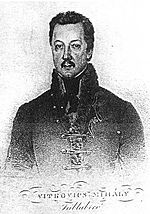Mihailo Vitković, Date of Birth, Place of Birth, Date of Death
TweetMihailo Vitković
Serbian poet
 Date of Birth: 25-Aug-1778
Date of Birth: 25-Aug-1778
 Place of Birth: Eger, Heves County, Hungary
Place of Birth: Eger, Heves County, Hungary
Date of Death: 09-Sep-1829
Profession: poet
Zodiac Sign: Virgo 
About Mihailo Vitković
- Mihailo Vitkovic (Eger, 25 August 1778-Pest, 9 September 1829) was a Serbian and Hungarian poet, translator and lawyer.
- The well-to-do Serbian lawyer was an active participant in the organization and efflorescence of Hungarian and Serbian cultural and literary development.
- He was a contemporary of György Bessenyei, Ferenc Kazinczy, József Kármán, Ferenc Toldy, Károly Kisfaludy, Mihály Csokonai Vitéz, József Bajza and Serbs Jovan Pacic, Jovan Muškatirovic and Lukijan Mušicki.
- Vitkovic carried an extensive correspondence with his prominent Hungarian contemporaries as well as his Serb writers and intellectuals. Two literatures—one Hungarian (Mihály Vitkovics) -- and the other Serbian (Mihailo Vitkovic) -- claim him, and with equal right.
- He cultivated some of the genres (the epigramma, for example) with equal success in both Hungarian and Serbian. Mihailo Vitkovic started his career as a writer on the staff of a conservative Hungarian paper adopting a militant attitude with respect to the radical Hungarian reform programme.
- There can be no doubt as to his having been a bilingual poet and author: he wrote with equal ease in Hungarian and in Serbian, he was equally interested in Serbian and Hungarian literary events, and took an active part in the literary life of both. As for Mihailo Vitkovic, his background already was multilingual and multicultural.
- The Serbs sent their children to the Szeged Piarist School and then to one of the Protestant secondary schools in Debrecen and Sopron, or to other schools in the north of Hungary where they had more opportunities for better education.
- Vitkovic 's schooling was no different.
- In 1804 he graduated from the University of Pest with a law degree, passed his bar exam, and started his practice in the same city.
- Later, he became a member of the Diet of Hungary (Sabor).
Read more at Wikipedia

